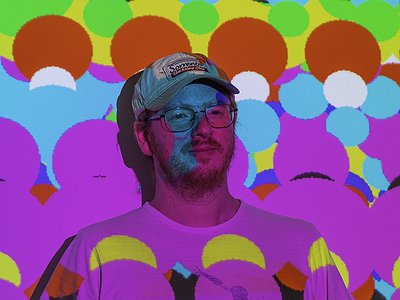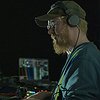Part 1
Name: Lee Malcolm aka Jinjé
Nationality: British
Occupation: Producer, DJ, multi-instrumentalist
Current release: Jinjé's Escape From Luna EP is out via Just isn't Music / Mesh March 29th 2024.
Recommendations: I’m a big graphic novel fan and one of my favourites is Transmetropolitan. Spider Jerusalem is an amazing character who somehow manages to do the right thing whilst being a hilarious dickhead to everybody. His insults are absolutely inspired!
There’s also an artist called Juan Cornella who just cracks me up as well. I have a few of his pieces around the house. If you already know his work you’ll have figured me out …
If you enjoyed this Jinjé interview and would like to stay up to date with his music, visit him on Instagram, and Facebook.
Do you think that some of your earliest musical experiences planted a seed for your interest in production and technology?
Definitely. I was lucky enough to be exposed to lots of music when I was young and also had access to a music room as my dad is also a musician. We had all sorts of instruments about the place. Drums, guitars, synths, pedals etc. However, he didn’t have much recording gear as that isn’t really his thing and one of his friends took care of that side of things.
I started playing drum kit when I was about five and piano at around seven. I remember starting to write songs with guitar at around eleven or twelve. I used tape recorders over the other side of the room from the drum kit and basically remembered the structure of the song in my head and just played the drum part. Having done that I played the drum recording from the speakers in front of the mic of the other tape recorder whilst performing the guitar part, the bass part, and sometimes keys or synth, bunnyhopping from one tape recorder to the other.
I didn’t have any other way of getting my ideas down at the time. The degradation was terrible but it was just about listenable. I remember thinking ‘there must be a better way of doing this’ …
What were your very first active steps with music technology and how would you rate the gains made through experience?
Well, apart from the previously mentioned crude beginnings, my first proper steps into music technology happened through a punk band I used to be in when I was a kid. We rehearsed in our drummer’s basement which had loads of gear in it. This was back in the mid nineties.
Him and his two mates had this electronic project going which fascinated me. They would arrive after the punk band had finished and start plugging all sorts of machines into a mixing desk, all sequenced from an Atari ST running the first ever Cubase. These guys were such an inspiration to me. They exposed me to amazing music that previously had been totally off my radar.
In fact the house was like this. The drummer’s dad is a folk musician and all these crazy talented people would turn up on a Friday and Saturday night and play this incredible music. When they had run out of steam the stereo would come on and I’d be mesmerised by the likes of Gong and Ozric Tentacles. I was hooked. I needed to get my hands on a synth of my own and start experimenting.
Unfortunately this wouldn’t happen for some time as computers and synths were and are expensive and I was hopelessly poor.
Were/are you interested in the history of production and recording? If so, which events, albums, artists, or insights stand out for you?
My fascination with production and recording took root from the band side of things first. Mics, pre-amps, room positioning, processing etc.
The sound of a drum kit has always been important to me. I had the pleasure of working with John Congleton over in the States and I loved how he recorded drums. Tons of mics all over the place. Really inspiring. We (Vessels) worked with him because of a record he made with a band called The Appleseed Cast who I still listen to.
We loved the drum sound so much we just wrote to him on the off-chance to see if he would work with us. To our surprise and joy he did. Twice!
[Read our John Congleton interview]
Another incredible sounding record is You Forgot It In People by Broken Social Scene. Again, the drum sound is amazing, compressed and tape saturated to perfection.
In my late teens I started going to clubs and illegal raves with the guys who got me into music production but I was still mostly only listening to guitar based music at home and it wasn’t until my friend put me onto a record by Amon Tobin, called Supermodified, that I truly started to understand how amazing electronic music can be outside of a club/rave setting.
I was drawn more into the hip hop world from this and artists like Prefuse 73 started to make an impact. Specifically the album, Vocal Studies & Uprock Narratives.
The way he chopped up more recognisable samples helped me understand what was going on under the hood, so to speak.
Making music, in the beginning, is often playful and about discovery. How do you retain a sense of playfulness and how do you still draw surprises from tools, approaches, and musical forms you may be very familiar with?
This is indeed a challenge. Keeping it fresh and exciting is hard but really important to me. I’m lucky enough to have a pretty decent home studio with plenty of instruments, gadgets, toys etc. I build islands of creativity in my space.
I have a modular world, drum machine world, synth world, effects world and a whole host of acoustic and electric instruments with some decent mics to record them with. I’ll start on an island depending on how I’m feeling. Am I in a rhythmical mood, a melodic or textural one, or simply just wanting to experiment with a sound concept?
I’ve developed various hacks to find inspiration. The modular is pretty good at throwing ideas back at me. Other times I need silence or a walk, a book or a conversation. I think I have to recognise and capitalise on all the possible stimuli and make them work for me. It’s not always about technology but rather the detachment from it to actually quiet the mind and give space for creativity to manifest.
I also love to learn how to play new instruments. I’ve just recently acquired a Balafon which is a bit like a Marimba but more lo-fi and buzzy. The challenge of a new interface, be it electronic or acoustic, is a great inspiration.
For your own creativity, what is the balance and relative importance between what you learned from teachers, tutorials and other producers on the one hand – and what you discovered, understood, and achieved yourself? What are examples for both of these?
That’s a tricky one to answer as I’m self taught in most things. I’m definitely inspired by other musicians and artists but I’m quite stubborn and OCD about how I learn so I tend to lock myself away and practice until it’s embedded in to my muscle memory.
When I was a kid I used to play along to my favourite tracks on the drums and then a bit later on the guitar. Regarding teaching myself and taking lessons from others, I get as far as I can with a thing then I look for guidance. At that point I feel like I have the right questions and also I don’t want to be wasting someones time and patience with silly or lazy queries.
I discovered that if I push myself hard enough I can normally get my fingers to play the right notes at the right time or get the right sound out of a synth or whatever. It takes patience and discipline. Something which I wish I was as proficient at in other aspects of my life. It turns out you just have to care about it enough and you’ll get better.
I want to make the best music I’m capable of. I want to listen back to it and think, yes, I don’t think I can make that any better. Sometimes that might mean leaving a track alone for a while, not forcing the result and trusting that when I listen to it again with the right frame of mind that I’ll solve the puzzle.
How and for what reasons has your music set-up evolved over the years and what are currently some of the most important pieces of gear and software for you?
It’s funny, when I first started back in my friend’s basement I had access to synths, drum machines, computers etc but I didn’t own any gear myself.
Then one day my housemate got a PC. We managed to get hold of a copy of Reason and I just connected with it. It made total sense to me. It was hardware but it was software. You could flip the thing round and plug anything into anything. This was utterly liberating so I spent days and weeks and months making track after track. I learned so many tricks from making electronic music in this way that I wouldn’t have come across in more traditional recording processes. Just from the sheer freedom of experimentation.
However, I struggled to get my mixes to sound as good as the music I was listening to. We didn’t have great speakers to be fair. Then one day, when I realised I was getting more serious about it, I took a bank loan and bought some gear. The first thing was a half decent pair of studio monitors. They weren’t great but they were streets ahead of what I was previously using. I was getting to the point of wanting to perform my tracks live as I didn’t really know how to DJ at the time so I got hold of Ableton after seeing somebody use it in a club.
Initially I just used it for playing my own tracks and I didn’t see its potential until I tried to make a track on it. It wasn’t as immediate as my relationship with Reason but after a bit of time it started to click. The way in which its interface worked became really intuitive and logical to me. So much so that I ended my obsession with Reason and I’ve never looked back. That was twenty years ago!
After working mostly in the box I started to record actual hardware having missed the visual immediacy of Reason. I was still recording the band (Vessels) into Cubase and had been for years (with a brief departure to Nuendo) but started to record directly into Ableton when I felt more confident with it. This led to getting used to recording instruments and sound machines, experimenting with pedals, mic positioning and sound design.
These days I still use Ableton but it’s more of a tape recorder now. I know I can still dive into the intricacies of it if I want to but I try to challenge myself to use the gear at my disposal. Some of which have become indispensable like my modular set up and the Novation Peak. Also, the Digitakt, Nord Drum and MS20 are regular contributors.
I love the MS20. I’m lucky enough to have an original 70s one. It’s such an expressive synth with great oscillators and filters. I also have a decent collection of congas and other percussion instruments. These get used a lot. I’ll build a hybrid drum kit out of various things and jam out patterns. I like to dive back into the recordings and pull out the good stuff, experimenting with processing on the way.






